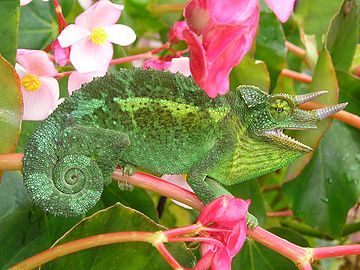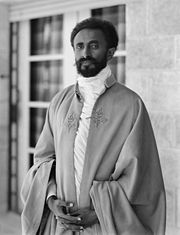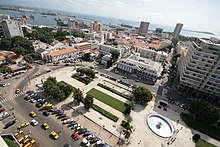Portal:Africa



Africa is the world's second-largest and second-most populous continent after Asia. At about 30.3 million km2 (11.7 million square miles) including adjacent islands, it covers 20% of Earth's land area and 6% of its total surface area. With nearly 1.4 billion people as of 2021, it accounts for about 18% of the world's human population. Africa's population is the youngest among all the continents; the median age in 2012 was 19.7, when the worldwide median age was 30.4. Based on 2024 projections, Africa's population will reach 3.8 billion people by 2099. Africa is the least wealthy inhabited continent per capita and second-least wealthy by total wealth, ahead of Oceania. Scholars have attributed this to different factors including geography, climate, corruption, colonialism, the Cold War, and neocolonialism. Despite this low concentration of wealth, recent economic expansion and a large and young population make Africa an important economic market in the broader global context. Africa has a large quantity of natural resources and food resources, including diamonds, sugar, salt, gold, iron, cobalt, uranium, copper, bauxite, silver, petroleum, natural gas, cocoa beans, and.
Africa straddles the equator and the prime meridian. It is the only continent to stretch from the northern temperate to the southern temperate zones. The majority of the continent and its countries are in the Northern Hemisphere, with a substantial portion and a number of countries in the Southern Hemisphere. Most of the continent lies in the tropics, except for a large part of Western Sahara, Algeria, Libya and Egypt, the northern tip of Mauritania, and the entire territories of Morocco, Ceuta, Melilla, and Tunisia, which in turn are located above the tropic of Cancer, in the northern temperate zone. In the other extreme of the continent, southern Namibia, southern Botswana, great parts of South Africa, the entire territories of Lesotho and Eswatini and the southern tips of Mozambique and Madagascar are located below the tropic of Capricorn, in the southern temperate zone.
Africa is highly biodiverse; it is the continent with the largest number of megafauna species, as it was least affected by the extinction of the Pleistocene megafauna. However, Africa also is heavily affected by a wide range of environmental issues, including desertification, deforestation, water scarcity, and pollution. These entrenched environmental concerns are expected to worsen as climate change impacts Africa. The UN Intergovernmental Panel on Climate Change has identified Africa as the continent most vulnerable to climate change.
The history of Africa is long, complex, and varied, and has often been under-appreciated by the global historical community. In African societies the oral word is revered, and they have generally recorded their history via oral tradition, which has led anthropologists to term them oral civilisations, contrasted with literate civilisations which pride the written word. During the colonial period, oral sources were deprecated by European historians, which gave them the impression Africa had no recorded history. African historiography became organized at the academic level in the mid-20th century, and saw a movement towards utilising oral sources in a multidisciplinary approach, culminating in the General History of Africa, edited by specialists from across the continent. (Full article...)
Selected article –
Orishas (singular: orisha) are divine spirits that play a key role in the Yoruba religion of West Africa and several religions of the African diaspora that derive from it, such as Haitian Vaudou, Cuban, Dominican and Puerto Rican Santería and Brazilian Candomblé. The preferred spelling varies depending on the language in question: òrìṣà is the spelling in the Yoruba language, orixá in Portuguese, and orisha, oricha, orichá or orixá in Spanish-speaking countries.
According to the teachings of these religions, the orishas are spirits sent by the supreme creator, Olodumare, to assist humanity and to teach them to be successful on Ayé (Earth). Rooted in the native religion of the Yoruba people, most orishas are said to have previously existed in òrún—the spirit world—and then became Irúnmọlẹ̀—spirits or divine beings incarnated as human on Earth. Irunmole took upon a human identity and lived as ordinary humans in the physical world, but because they had their origin in the divine, they had great wisdom and power at the moment of their creation. (Full article...)
Featured pictures –
Did you know (auto-generated) -

- ... that Carver Court in Coatesville, Pennsylvania, was built to house African-American steelworkers during World War II?
- ... that Lea Ackermann, a German nun of the Missionary Sisters of Our Lady of Africa, fought against forced prostitution and sex tourism in East Africa?
- ... that many African countries provide for legal abortion in their reproductive health laws, but such laws have been passed without grounds for legal abortion in Madagascar and in Senegal?
- ... that Agri-Expo is the oldest agricultural society in Africa?
- ... that Roland Jefferson, the first African-American botanist to work at the U.S. National Arboretum, helped preserve the famous flowering cherry trees in Washington, D.C.?
- ... that Kenyan coffee farmer "Pinkie" Jackson amassed Africa's largest collection of native butterflies?
Categories
Selected biography –
Jason Sendwe (1917 – 19 June 1964) was a Congolese politician and the founder and leader of the General Association of the Baluba of the Katanga (BALUBAKAT) party. He later served as Second Deputy Prime Minister of the Democratic Republic of the Congo (then Republic of the Congo) from August 1961 until January 1963, and as President of the Province of North Katanga from September 1963 until his death, with a brief interruption.
Sendwe was born in 1917 in Mwanya, Kabongo Territory, Belgian Congo, to a ethnic Baluba family. He was educated in Methodist schools and nursing institutions. Unable to become a doctor due to a lack of medical schools in the Congo, he found work as a minister, teacher, and nurse. He became involved in several cultural organisations, and in 1957 founded BALUBAKAT to fight for the interests of the Baluba. He espoused Congolese nationalism and believed that the Congo should remain a united country after Belgian rule. In May 1960, shortly before the country's independence, he was elected to the newly constituted Chamber of Deputies. Sendwe sought to obtain control over the government of Katanga Province, but lost to a power struggle against his rival, Moïse Tshombe, and the Confederation of Tribal Associations of Katanga (CONAKAT) party. Regardless, Prime Minister Patrice Lumumba nominated him for the office of State Commissioner for Katanga. (Full article...)
Selected country –
 |
 |
|

| ||
Rwanda, officially the Republic of Rwanda, is a small landlocked country in the Great Lakes region of east-central Africa, bordered by Uganda, Burundi, the Democratic Republic of the Congo and Tanzania. Home to approximately 9 million people, Rwanda supports the densest human population in continental Africa. A verdant country of fertile and hilly terrain, the small country bears the title "Land of a Thousand Hills" (French: Pays des Mille Collines; Kinyarwanda: Igihugu cy'Imisozi Igihumbi).
Rwanda is a rural country with about 90% of the population engaged in agriculture. It has few natural resources and minimal industry. Primary exports are coffee and tea, with the addition in recent years of minerals (mainly coltan) and flowers. The country's prevalent use of subsistence agriculture and the resulting depletion of soil fertility, its dense and increasing population, as well as its uncertain climate have rendered Rwanda a country of endemic malnutrition and widespread poverty. It has a low gross national product (GNP) and has been identified as a Heavily Indebted Poor Country (HIPC). (Read more...)
Selected city –
Dakar (/dɑːˈkɑːr, dæ-/ UK also: /ˈdækɑːr/; French: [dakaʁ]; Wolof: Ndakaaru) is the capital and largest city of Senegal. The department of Dakar has a population of 1,278,469, and the population of the Dakar metropolitan area was at 4.0 million in 2023.
Dakar is situated on the Cap-Vert peninsula, the westernmost point of mainland Africa. Cap-Vert was colonized by the Portuguese in the early 15th century. The Portuguese established a presence on the island of Gorée off the coast of Cap-Vert and used it as a base for the Atlantic slave trade. France took over the island in 1677. Following the abolition of the slave trade and French annexation of the mainland area in the 19th century, Dakar grew into a major regional port and a major city of the French colonial empire. In 1902, Dakar replaced Saint-Louis as the capital of French West Africa. From 1959 to 1960, Dakar was the capital of the short-lived Mali Federation. In 1960, it became the capital of the independent Republic of Senegal. Dakar will host the 2026 Summer Youth Olympics. (Full article...)
In the news
- 12 February 2024 –
- Two boats collide on the Congo River near Kinshasa, Democratic Republic of the Congo; with the death toll remains unclear. (AP)
- 11 February 2024 – 2023 Africa Cup of Nations
- In association football, hosts Ivory Coast win their third Africa Cup of Nations by defeating Nigeria 2–1 in the final. Sébastien Haller scores the winning goal in the 81st minute. (The Guardian)
- 10 February 2024 – Somali civil war
- Four Emirati soldiers and a Bahraini military officer are killed, while ten other people are injured, when a soldier opens fire at a military base in Mogadishu, Somalia, before being killed in the ensuing shootout. Al-Shabaab claims responsibility. (AP)
- 10 February 2024 –
- A Eurocopter EC130 helicopter crashes near Nipton, California, United States, killing all the six people on board, including Nigerian banker Herbert Wigwe. (CBS News)
- 10 February 2024 – 2023–2024 Senegalese protests
- Violent protests occur in Senegal following an announcement by President Macky Sall that presidential elections have been delayed from February 25 to December 15. (Sky News)
- 9 February 2024 –
- At least 18 people are killed during a collision between a bus and a truck on a road in Kinshasa, Democratic Republic of the Congo. (AP)
Updated: 16:33, 14 February 2024
General images -
Africa topics
More did you know –
- ...that Iyabo Obasanjo-Bello, a Nigerian Senator from the People's Democratic Party, is the daughter of former President Olusegun Obasanjo?
- ...that the 2007 South Africa miners' strike, which impacted over 240,000 workers, was the first ever industry-wide miners' strike in the history of South Africa?
- ...that Seleh Leha, a town in Tigray Region in northern Ethiopia, was the site of a leprosarium built during the Italian occupation of East Africa and abandoned in 1941?
- ...that Sarir field, an oil field in Cyrenaica operated by the Arabian Gulf Oil Company (AGOCO), is considered to be the largest in Libya, with estimated oil reserves of 12 Gbbl (1.9×109 m3)?
Related portals
Major Religions in Africa
North Africa
West Africa
Central Africa
East Africa
Southern Africa
Associated Wikimedia
The following Wikimedia Foundation sister projects provide more on this subject:
-
Commons
Free media repository -
Wikibooks
Free textbooks and manuals -
Wikidata
Free knowledge base -
Wikinews
Free-content news -
Wikiquote
Collection of quotations -
Wikisource
Free-content library -
Wikispecies
Directory of species -
Wikiversity
Free learning tools -
Wikivoyage
Free travel guide -
Wiktionary
Dictionary and thesaurus























































































